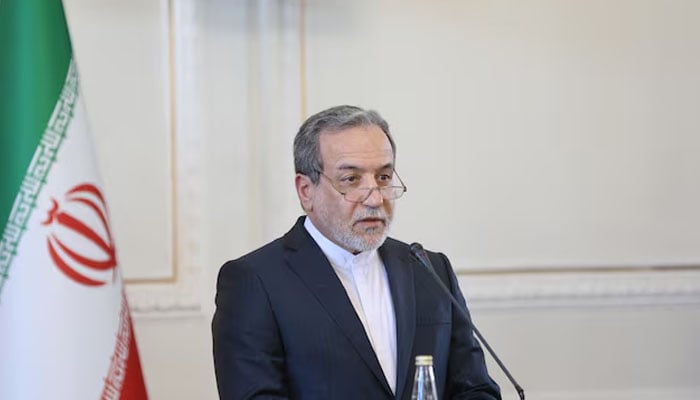Select Language:
Tehran Issues Warning to the U.S. Over Potential Israeli Strike on Nuclear Facilities
TEHRAN: Iran has issued a warning, holding the United States accountable for any attacks on its nuclear facilities by Israel, just before new discussions on nuclear agreements between Washington and Tehran.
This assertion follows a report from CNN, which referenced anonymous U.S. officials indicating that Israel was preparing to target Iranian nuclear sites while U.S.-Iran negotiations are ongoing.
Iran’s Foreign Minister Abbas Araghchi stated in a letter to the United Nations, released on Thursday, "We believe that should the Zionist regime attack the nuclear facilities of the Islamic Republic of Iran, the U.S. government will also be implicated and held legally responsible."
He further added, "Iran firmly cautions against any reckless actions by the Zionist regime and will respond decisively to any threats or unlawful acts from this regime."
The nuclear discussions, which began on April 12, represent the highest-level engagement between the two long-time adversaries since the U.S. withdrew from a significant agreement with Iran and world powers in 2018 during President Donald Trump’s administration.
Oman, acting as a mediator, announced that the fifth round of talks is scheduled for Friday in Rome. The U.S. delegation is expected to include Steve Witkoff, a negotiator and associate of Trump, as well as Michael Anton, who leads policy planning at the State Department and has been involved in technical aspects of the discussions.
A major hurdle in the negotiations pertains to uranium enrichment. The 2015 agreement, brokered by former President Barack Obama, permitted Iran to enrich uranium at low levels strictly for civilian energy use.
Currently, Iran has been enriching uranium up to 60%, significantly higher than the 3.67% limit outlined in the 2015 agreement, but still below the 90% threshold necessary for nuclear weapons.
Sanctions Relating to Missile Development
Trump, who has pledged to improve upon the Obama-era agreement, stated last week during a visit to Qatar that he believes Iran has accepted key conditions and that his diplomatic approach would sidestep military conflict.
U.S. Secretary of State Marco Rubio reiterated before Congress on Wednesday that the Trump administration would enforce a ban on any form of enrichment. "Iran cannot possess an enrichment capability, as that would make them a threshold nuclear power," Rubio declared.
Iran seeks relief from the extensive sanctions imposed by Trump in 2018, which penalize all nations for purchasing Iran’s crucial oil exports.
Rubio, when questioned by lawmakers, hinted that the United States would maintain sanctions related to Iran’s ballistic missile development, an issue not explicitly addressed in the 2015 agreement. "There are sanctions connected to terrorism and their ballistic missile program. Those sanctions will remain in effect unless explicitly included in any new deal," he explained.
Although Rubio did not address the CNN report directly, he acknowledged that it’s no secret Israel has been exploring military options.
Devastating Consequences Expected
Israel, known as Iran’s arch-nemesis, has consistently threatened to take military action against Iranian nuclear installations but has faced resistance from Trump.
On Thursday, Ali Mohammad Naini, spokesperson for Iran’s Islamic Revolutionary Guard Corps, warned of a "devastating" response should Israel attack. "If the delusional Zionist regime makes a reckless move, it will undoubtedly face a devastating and decisive response within its small and vulnerable territory," Naini stated, as reported by the ISNA news agency.
That same day, Iran’s army unveiled new drone technology, including two reconnaissance drones and one kamikaze drone.
Earlier, a group of supporters rallied near the Fordow nuclear enrichment facility south of Tehran, displaying Iranian flags and chanting slogans advocating for the nation’s nuclear rights, such as "Nuclear energy is our inalienable right" and "No compromise, no surrender, only confrontation with America."
Iran does not recognize Israel, often referring to it as the "Zionist regime," and the two nations have engaged in a persistent shadow conflict for years. The previous year marked the first time the two adversaries exchanged direct assaults amid escalating regional tensions triggered by the Gaza conflict.







